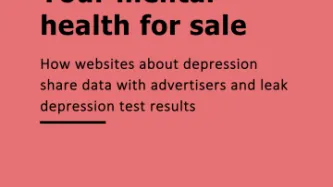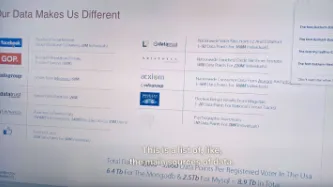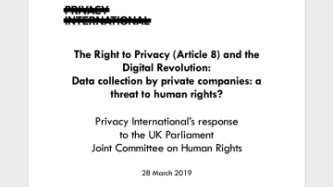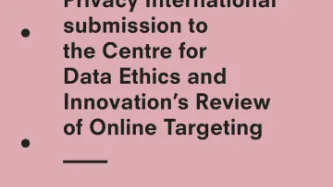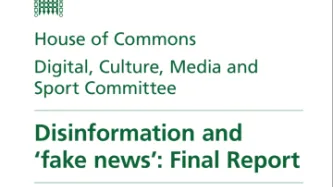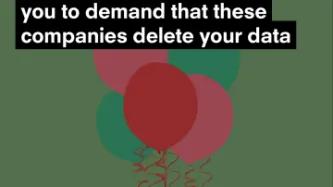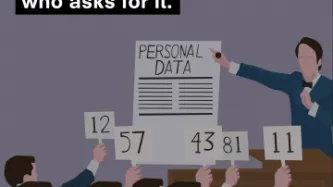Search
Content type: News & Analysis
Yesterday, we found out that Google has been reported to collect health data records as part of a project it has named “Project Nightingale”. In a partnership with Ascension, Google has purportedly been amassing data for about a year on patients in 21 US states in the form of lab results, doctor diagnoses and hospitalization records, among other categories, which amount to a complete health history, including patient names and dates of birth.
This comes just days after the news of Google'…
Content type: Long Read
This research is the result of a collaboration between Grace Tillyard, a doctoral researcher in the Media, Communications and Cultural Studies department at Goldsmiths College, London, and Privacy International.
Social Protection Systems in the Digital Age
In the digital age, governments across the world are building technologically integrated programmes to allow citizens to access welfare payments. While smart and digital technologies hold the potential to streamline administrative…
Content type: News & Analysis
The latest news of Twitter “inadvertently” sharing email addresses or phone numbers provided for safety or security purposes (for example, two-factor authentication) for advertising purposes is extremely concerning for several reasons.
First of all, it is not the first time for Twitter's used people's data in ways they wouldn't expect or that ignores their choices: in August, the company disclosed that it may have shared data on users with advertising partners, even if they had opted out from…
Content type: Long Read
We found this image here.
Using Facebook, Google, and Twitter’s ad libraries, PI has tried to understand how political ads are targeted in the UK. This information – which should be very clear on political ads – is instead being squirreled away under multiple clicks and confusing headings.
Importantly, in most countries around the world, users cannot understand why they’re being targeted with political ads on these platforms at all. This is because Facebook, Google, and Twitter have taken…
Content type: Long Read
A new study by Privacy International reveals how popular websites about depression in France, Germany and the UK share user data with advertisers, data brokers and large tech companies, while some depression test websites leak answers and test results with third parties. The findings raise serious concerns about compliance with European data protection and privacy laws.
This article is part of a research led by Privacy International on mental health websites and tracking. Read our…
Content type: Report
The full report of Privacy International's study on how popular websites about depression in France, Germany and the UK share user data with advertisers, data brokers and large tech companies, while some depression test websites leak answers and test results with third parties. The findings raise serious concerns about compliance with European data protection and privacy laws.
Content type: News & Analysis
This article is part of a research led by Privacy International on mental health websites and tracking. Read our full report.
According to the World Health Organisation (WHO), 25 percent of the European population suffers from depression or anxiety each year, yet about 50% of major depressions remain untreated. This means that everyday thousands of people are looking for information about depression online. They take tests to find out how serious their symptoms are, they try to access…
Content type: Advocacy
Dear Chair and Committee colleagues,
Privacy International is an international NGO, based in London, which works with partners around the world to challenge state and corporate surveillance and data exploitation. As part of our work, we have a dedicated programme “Defending Democracy and Dissent” where we advocate for limits on data exploitation throughout the electoral cycle.
We have been closely following the important work of the Committee. Prompted by the additional evidence provided…
Content type: News & Analysis
Image: The Great Hack publicity still, courtesy of Netflix.
This is a review of the documentary 'The Great Hack' originally published on IMDb.
This documentary is a fascinating account of The Facebook/Cambridge Analytica data scandal.
In early 2018, Cambridge Analytica became a household name. The company had exploited the personal data of millions of Facebook users, without their knowledge or consent, and used it for political propaganda.
At a running time of almost two hours, The Great…
Content type: Long Read
image from portal gda (cc)
Many people are still confused by what is 5G and what it means for them. With cities like London, New York or San Francisco now plastered with ads, talks about national security, and the deployment of 5G protocols being treated like an arms race, what happens to our privacy and security?
5G is the next generation of mobile networks, which is meant to be an evolution of the current 4G protocols that mobile providers have deployed over the last decade, and there are…
Content type: Long Read
Photo by David Werbrouck on Unsplash
This is an ongoing series about the ways in which those searching for abortion information and procedures are being traced and tracked online. This work is part of a broader programme of work aimed at safeguarding the dignity of people by challenging current power dynamics, and redefining our relationship with governments, companies, and within our own communities. As an enabling right, privacy plays an important role in supporting the exercise of…
Content type: Long Read
By Valentina Pavel, PI Mozilla-Ford Fellow, 2018-2019
Our digital environment is changing, fast. Nobody knows exactly what it’ll look like in five to ten years’ time, but we know that how we produce and share our data will change where we end up. We have to decide how to protect, enhance, and preserve our rights in a world where technology is everywhere and data is generated by every action. Key battles will be fought over who can access our data and how they may use it. It’s time to take…
Content type: Advocacy
In March 2019, Privacy International responded to a call for evidence for an inquiry by the UK Parliament's Joint Committee on Human Rights into "The Right to Privacy (Article 8) and the Digital Revolution".
Our suggestions included that, the human rights framework should support:
Increasing individuals’ control over their data to encourage the design of technologies that protect peoples’ autonomy and privacy.
Increasing security to result in more rights and protections for…
Content type: Long Read
Image courtesy of Michael Coghlan
The long-speculated Facebook cryptocurrency is finally here! Libra!
Libra Association, an entity co-founded by Facebook, has announced the creation of a new cryptocurrency, Libra, "a simple global currency and financial infrastructure that empowers billions of people".
The white paper that outlines the rationale for the new currency makes a number of heady statements, some which anyone who cares about rights should commend -- and some which should…
Content type: Advocacy
In early June 2019, PI engaged in the UK's Centre for Data Ethics and Innovation consultation regarding online targeting. PI focused its submission on the use of targeting in online political and issue-based advertising, and the collection and use of data to target people online.
In considering the impact of online targeting, it is essential that the Centre for Data Ethics and Innovation have due regard for privacy as a fundamental right (as enshrined in UK, European, and International Law).…
Content type: News & Analysis
Photo by Mike MacKenzie (via www.vpnsrus.com)
Ever, a cloud storage app, is an example of how facial recognition technology can be developed in ways people do not expect and can risk amplifying discrimination.
Ever is a cloud storage app that brands itself as “helping you capture and rediscover your life’s memories,” including by uploading and storing personal photos; Ever does not advertise that it uses the millions of photos people upload to train its facial recognition software,…
Content type: Explainer
It’s tough to minimise targeted ads on phones because ads can be delivered based on data from the device level (such as what operating system your phone is using or based on unique numbers that identify your phone), browser level (what you search for within a browser), and within the apps you use. An app could target ads at you based on your location (tied to your unique device id number(s)) for example. Apps, including Instagram, direct you to opt-out of targeted ads at the device level. Here'…
Content type: Press release
The Irish Data Protection Commission has today launched an inquiry into the data practices of ad-tech company Quantcast, a major player in the online tracking industry. PI's 2018 investigation and subsequent submission to the Irish DPC showed how the company is systematically collecting and exploiting people's data in ways people are unaware of. PI also investigated and complained about Acxiom, Criteo, Experian, Equifax, Oracle, and Tapad.
PI welcomes this announcement and its focus on…
Content type: Long Read
Image Source: "Voting Key" by CreditDebitPro is licensed under CC BY 2.0
Democratic society is under threat from a range of players exploiting our data in ways which are often hidden and unaccountable. These actors are manifold: traditional political parties (from the whole political spectrum), organisations or individuals pushing particular political agendas, foreign actors aiming at interfering with national democratic processes, and the industries that provide products that …
Content type: Examples
The New York Times picked 16 categories (like registered Democrats or people trying to lose weight) and targeted ads at people in them. They used the ads to reveal the invisible information itself, noting that it is a "story of how our information is used not just to target us but to manipulate others for economic and political ends — invisibly, and in ways that are difficult to scrutinize or even question."
The article illustrates that even though data providers don’t…
Content type: News & Analysis
The first half of 2018 saw two major privacy moments: in March, the Facebook/ Cambridge Analytica scandal broke, followed in May by the EU General Data Protection Regulation ("GDPR") taking effect. The Cambridge Analytica scandal, as it has become known, grabbed the attention and outrage of the media, the public, parliamentarians and regulators around the world - demonstrating that yes, people do care about violations of their privacy and abuse of power. This scandal has been one of…
Content type: Long Read
“Truth exists, but you have to find it”, Oleksandra Matviychuk of Ukraine’s Center for Civil Liberties told me as I interviewed her in central Kyiv one week before the 2019 Ukrainian run-off election, “and in order to do so you have to make some effort”. We’re talking about her experience working on the ground in Ukraine, a country with a long history of battling against disinformation.
Activists in Ukraine have long experience navigating the noisy and chaotic environment that disinformation…
Content type: Long Read
Last week, an investigation by Bloomberg revealed that thousands of Amazon employees around the world are listening in on Amazon Echo users.
As we have been explaining across media, we believe that by using default settings and vague privacy policies which allow Amazon employees to listen in on the recordings of users’ interactions with their devices, Amazon risks deliberately deceiving its customers.
Amazon has so far been dismissive, arguing that people had the options to opt out from the…
Content type: News & Analysis
This past weekend, in an Op-Ed in the Washington Post, Mark Zuckerberg called for new regulations to address harmful content, electoral integrity, privacy and data portability.
Nine years since he proclaimed that privacy is no longer a social norm, four years since Facebook noticed broadscale harvesting and exploitation of their users' data by third party companies and chose not to tell us about it, two years since he denied there were any abuses of data in political campaigns, and…
Content type: News & Analysis
We found this image here.
Today, a panel of competition experts, headed by Professor Jason Furman, the former chief economic adviser of in the Obama administration, confirmed that tech giants, like Facebook, Amazon, Google, Apple and Microsoft, do not face enough competition.
Significantly, the report finds that control over personal data by tech giants is one of the main causes preventing competition and ultimately innovation.
Privacy International's research has shown clear examples of…
Content type: News & Analysis
Privacy International welcomes the focus on data and privacy contained in the final report by the UK House of Commons Digital, Culture, Media and Sport Committee (DCMS) on Disinformation and ‘fake news’. Beyond our control, companies and political parties have banded together to exploit our data. This report establishes essential steps to remedying this downward spiral. An important part of the democratic process is freedom of expression and right to political participation, including the right…
Content type: News & Analysis
Dear will.i.am,
We saw your piece in the Economist and were very excited to learn that you care about privacy as much as we do. At PI we expose government and corporate bad behaviours, we disrupt their plans, and identify a hopeful path forward.
That’s why we very much agree with you that people need much more protection, transparency and control over their personal data. Cheers for: “I want to have it clearly explained in plain language who has access to my camera, to my photos, who’s…
Content type: News & Analysis
Email addresses
Acxiom: [email protected]
Criteo: [email protected]
Equifax: [email protected]
Experian: [email protected]
Oracle: https://oracle.ethicspointvp.com/custom/oracle/dp/en/form_data.asp
Quantcast: [email protected] cc: [email protected]
Tapad: [email protected]
Letter for Acxiom and Oracle
subject line: Right to Erasure Request
I am concerned your company exploits my data.
In accordance with my right[s] under the General Data…
Content type: News & Analysis
Our team wanted to see how data companies that are not used to being in the public spotlight would respond to people exercising their data rights. You have the right under the EU General Data Protection Regulation ("GDPR") to demand that companies operating in the European Union (either because they are based here or target their products or services to individuals in the EU) delete your data within one month. We wrote to seven companies and requested that they delete our data, and we've made…
Content type: Press release
Today, Privacy International has filed complaints against seven data brokers (Acxiom, Oracle), ad-tech companies (Criteo, Quantcast, Tapad), and credit referencing agencies (Equifax, Experian) with data protection authorities in France, Ireland, and the UK. Privacy International urges the data protection authorities to investigate these companies and to protect individuals from the mass exploitation of their data.
Our complaints target companies that, despite exploiting the data of millions of…





